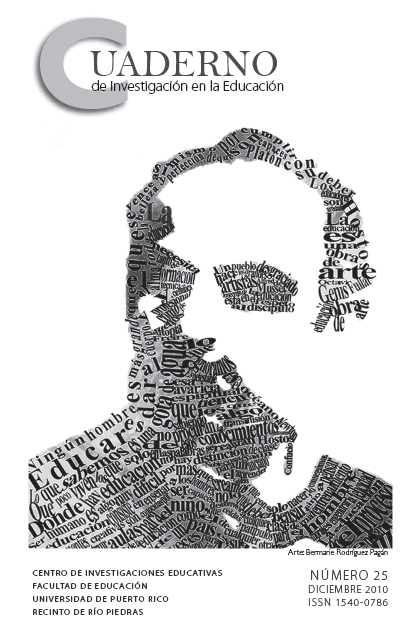Abstract
How to cite:
González González, L., & Lugo, D. (2010). Tablet PC: Herramienta para desarrollar destrezas de información en los estudiantes de escuela elemental. Cuaderno de Investigación en la Educación, 25, 177-191. Retrieved from https://revistas.upr.edu/index.php/educacion/article/view/13541
References
American Library Association. (2000). Information Community Partnerships Took Kit. Disponible en http://www.ala.org/
American Library Association, Association of College and Research Libraries. (s.f.) Information Literacy. Disponible en http://www.ala.org/acrl
Big 6. (s.f.) Big 6: An information problem. Solving process. Disponible en http://www.big6.org/
Bonilla, V. (2005, diciembre). Estrategias para recopilar información. Entrevistas y cuestionarios. Taller presentado en la Facultad de Educación de la Universidad de Puerto Rico, Recinto de Río Piedras.
Crook, J. (1994). The Social Studies teacher as curriculum creator: Reflections on
teaching middle school Social Studies. En Ross, W. (Ed.) Reflective practice in Social Studies (pp. 13-21). Washington, DC: National Council for the Social Studies.
Departamento de Educación. (2000). Estándares de excelencia, Programa de Servicios Bibliotecarios y de Información (edición revisada). San Juan: Taller de Artes Gráficas del Departamento de Educación.
Dewey, J. (1933). How we think: A restatement of the relation of reflective thinking to the educative process. Boston: D.C. Heathand Company.
Eisenberg, M. & Berkowitg, B. (1987). The Big 6 (versión electrónica) Disponible en: http://www.Big6.com
Eisenberg, M. & Berkowitg, B. (1988). Curriculum initiative: An agenda and strategy for library media programs. Norwood, NJ: Ablex.
Eisenberg, M. & Doug, I. (2002). Learning ADN teaching Information Technology: Computer skills in context. Recuperado de base de datos Eric Digest en http://www.eric.ed.gov
González, L. (2006, mayo). Entrevista a estudiantes de la Escuela Elemental de la UPR realizadas en la Escuela Elemental de la Universidad de Puerto Rico, Río Piedras.
Jenne, J. (1994). Why teachers research? En Ross, W. (Ed.), Reflective practice in Social Studies (pp. 59-68). Washington, DC: National Council for the Social Studies.
López de Méndez, A. (2005, agosto). Investigación en acción en la sala de clases. Taller presentado en la Facultad de Educación Universidad de Puerto Rico, Recinto de Río Piedras.
Lucca, N. (2003). Descripción, análisis e interpretación. El modelo de Harry F. Wolcott. En Lucca Irizarry, N. & Berríos Rivera, R., Investigación cualitativa en educación y ciencias sociales (pp. 936-503). Hato Rey, PR: Publicaciones Puertorriqueñas.
Mathison, S. (1994). Critical reflection on classroom practice: Teaching as an investigative activity. En Ross, W. (Ed.), Reflective practice in Social Studies (pp. 23-28). Washington, DC: National Council for the Social Studies.
Pérez Medina, Evelyn. (2000). Conceptualización del enfoque hacia el dominio de las destrezas de información. Acceso, 2(4), 45-47.
Pitts, J. (1995). Mental models of information: 1993-1994 AASL/Highsmith research Award Study. School Library Media Quarterly, 23(3), 177-184.
Robleyer, M. D. (2003). Integrating technology into teaching. New Jersey, Merill.
Toss, R. (1995). Integrated information literacy skills instruction: Does it make a difference? School Library Media Quarterly, 23(2), 133-139.
VanFossen, P. & Shiveley, J. (2003, otoño). A content analysis of Internet sessions presented at the National Council for Social Studies Annual Meeting, 1995-2002. Theory and Research in Social Education, 31(4), 502-521.
Watson, G. & Glaser, E. (1964). Critical Thinking Appraisol. New York: Harcourt, Brasce and Wold.
The contents published in the Puerto Rico Journal of Education is freely distributed under open access practices, in accordance with the Creative Commons license, Attribution-NonCommercial 4.0 International (CC BY-NC 4.0). Through these principles, the journal and its authors allow readers to access, reproduce and share articles in full text. Users should give credit to authors in a reasonable way without suggesting they have their support. Under no circumstances, readers may make use of the contents for commercial purposes. The authors retain copyright on their works.

